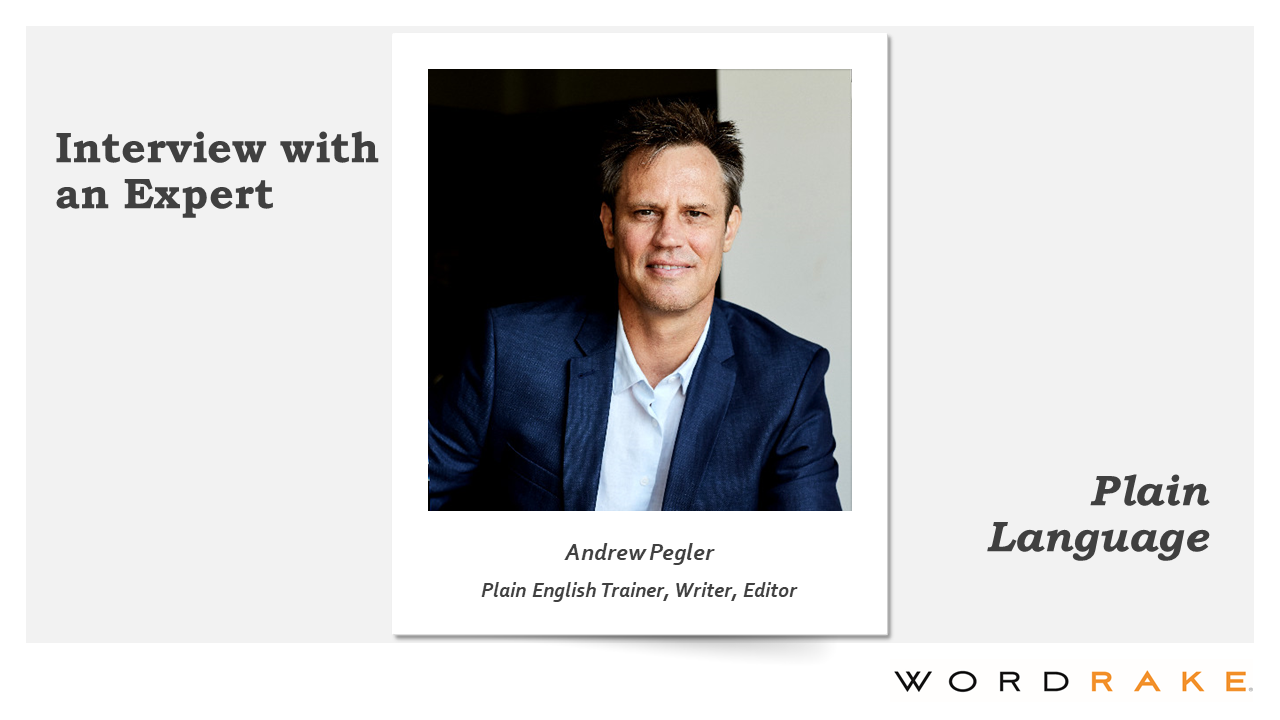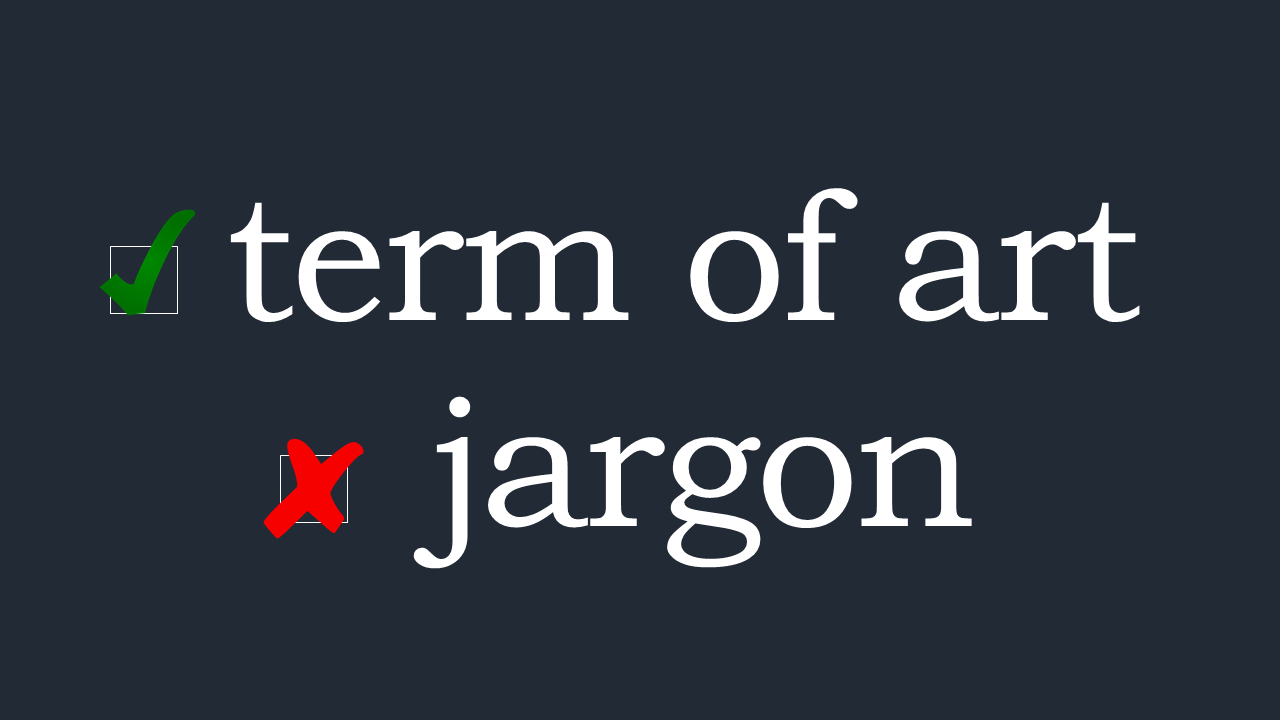When it comes to plain language, law and finance are two of the industries most reluctant to change. But changing gets easier when you have a plain language partner who knows how to guide the transition. That’s where plain language expert Andrew Pegler excels. He converts legal contracts and business reports to plain English, then trains the organization’s lawyers and staff to do the same.
Andrew has built his career convincing corporations and law firms that plain language has brand advantages, then helping them write in a new way. Andrew’s work is a study in successful change management. He delivers his plain English workshops at an appropriate level, respects and develops the existing knowledge and skills of staff, and provides useable writing and editing tips and techniques.
We spoke with Andrew about plain language in law. In this interview, you’ll learn how plain language is a brand advantage and get eight tips for using plain language in your own writing. Read on for Andrew’s lessons.
What is your role and how is it connected to plain language?
I am the Principal of Andrew Pegler Media Pty Ltd based in Melbourne, Australia. We are Plain English specialists and clear design practitioners.
What prompted your interest in plain language?
I've always liked whittling. Even in art I like minimalism. I discovered that I could write rather late in life and went into journalism and wrote a few books. I discovered a passion for simplifying and clarifying the complicated. Parlaying that into a business has proven to be a service welcomed by clients, their customers, and stakeholders.
What is the difference between plain language and plain English?
I'm not sure there is any? But, whether it's plain English or plain language, both aim to give the reader a good chance of understanding your message on the first reading, and in the way that you want them to. It’s clear, direct writing that uses as few words as you need, and avoids ambiguity, verbiage, and complex sentences. It does not, however, mean always using simple words at the expense of the most accurate or writing like a preschooler. You need to write to your audience, not down to them. At the same time, they need to get what's going on and react in the way that you’d hope.
How are readability and plain language related?
They're both intimately linked. Put simply plain English / language is more readable.
What are unexpected ways that plain language comes up in law, healthcare, and finance?
The word unexpected is interesting here. In many ways, sadly, it's expected in these sectors. Rightly or wrongly, the public regards the law, healthcare, and finance with suspicion. This is the result of many years of—in the view of some—dense legal contracts and befuddling waffles leading to misunderstandings or misplaced expectations.
So many of these contracts and forms are poorly written, the victims of decades of accumulated legalese, which tends to pile up like plaque in your arteries—clauses, sub-clauses, caveats, and confusing provisions. Importantly, this is not without good reason, companies rightly want to avoid risk. But, with skillful editing, these contracts, PDSs, aged care brochures, etc., can be transformed into clear, honest, and simple documents. And that’s a very strong brand asset.
Here are two examples of how plain English offers clients more with less. The first one is for a large insurance client, the second for a law firm.
Before: The insured person may cancel the policy by giving the Company written notice of cancellation. The serving of the notice is sufficient notice and the effective date of cancellation in the notice will be the end of the policy term.
After: To cancel your policy, simply write to the Company outlining when you want it canceled.
Before: The definition of a partnership varies across jurisdictions, with each definition encompassing a variety of criteria in determining the existence of a partnership within that jurisdiction.
After: Jurisdictions define partnerships differently.
What are some factors that indicate a need to write in plain language?
Andrew Pegler Media was founded on the belief that everyone should have access to easy-to-understand, concise copy. If it doesn’t have this, it needs work. Also, sometimes the audience is very specific. It could be for academics or for those with cognitive challenges. So, if it’s not appropriate it needs to be massaged into the right tone.
How does plain language impact access to justice?
For the public to feel confident, there must be nothing to make them suspicious. Trust is fleeting. Very fleeting. And the relationship between suspicion and trust is highly precarious. In fact, suspicion hangs like the sword of Damocles over trust.
Legal language can be alienating to those not familiar with it, i.e., 95% of the population. Alienating so many people runs contra to the ambition of the law to deliver justice and protect those that need it.
Many professions (i.e., law, medicine, finance) are gatekeepers of important information for the public. What obligations do professionals have to communicate in plain language?
The exchange of experience and knowledge should be a generous one. Crucial to this is keeping it simple. If you’re the consumer and you’re paying the bills, you should be treated with appropriate respect and information should be designed for your understanding.
What’s the most important—yet simple—change professionals can make to consumer-facing documents to improve understanding?
My secret to making something understandable to my client’s intended audience is simple—I don’t need to be Tolstoy, all I need is a genuine desire to inform.
What’s the biggest danger to consumers if they don’t understand what is being communicated to them?
Poorly informed decision-making starts with poor information. Unclear information puts you at a disadvantage. Unexpected penalties, fees, or risks that might see your house being sold from under you, the “hidden costs” of putting your life savings in a managed fund, or an ill-advised investment decision. The list goes on.
What’s one piece of advice that you would offer to help a professional start using plain language?
Follow my 8 tips for plain English:
- Consider your audience.
- Keep it simple.
- If you have to look up a word’s meaning, don’t use it.
- Use the active voice.
- Don’t use jargon if there’s a plain English equivalent.
- Get your punctuation right.
- Have one idea per sentence.
- If it’s not crucial, delete it.
What’s the most convincing statistic that you can share to convince professionals to start using plain language?
Our clients believe us when we explain that trusted, well-written information is a brand asset. Our work is often measured by things like fewer calls to the call center and hence the money saved. Or how many mistakes people make in submitting a form. We also write lots of plain English blogs for law firms, banks, insurance companies simplifying the complex for the public. The metric to judge the success of a blog is usually the open rate.
What are a few surprising areas where plain language is valued?
Plain English / language is increasingly valued in the law. We're often commissioned to simplify retail leases. Retailers are not lawyers; they do not deal in legalese every day. They deal with products and merchandising. Leases given to them to sign should be written in a language that more politely respects their expertise.
About Andrew Pegler
Andrew Pegler is principal of Andrew Pegler Media Ltd. He is an award-winning plain English editor and writer who is highly experienced in providing in-house, professional plain English workshops for federal, state, and local government bodies, law firms, and leading ASX companies. Andrew holds a BA in Communications (Journalism/ Economics) and Certificates in accounting, tax law, proofreading, editing, and public speaking. Andrew is a regular presenter on plain English and the law at the Clarity conference and at Victorian Law Week.
Plain Language and Clear Communication Interview Series
This interview is part of a series produced in connection with WordRake’s support for the Access for All: Plain Language is a Civil Right conference. WordRake is editing software for sophisticated writers who must communicate clearly. It improves writing by simplifying and clarifying text, cutting jargon, and recommending plain English replacements. WordRake runs in Microsoft Word and Outlook, and its suggestions appear in the familiar track-changes style. You decide when to run WordRake and which edits to accept, so you get quality and speed without sacrificing control. Editing for clarity and brevity has never been easier. Try WordRake for free for 7 days.









